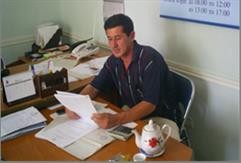
October 2015—As a shareholder of Bakhtiyor-1 Farm in Khatlon province, Tajikistan, Abdurakhmon Safarov worked his farm for many years. But due to dwindling profits, Safarov traveled to Russia to earn money and better provide for his family.
He is not alone. Many Tajik farmers who own shares in community farms are compelled to find work in Russia to bolster their incomes. But if their land is not being used, the head of a farm might independently seek to terminate that person’s land rights and distribute his share among other members of the farm.
Such was the case for Safarov. When the head of his farm learned that Safarov left for Russia in May 2009, he illegally terminated Safarov’s land rights and confiscated his land share.
When Safarov returned to his family in Tajikistan one year later, he discovered his land was distributed between other shareholders.
For four years, from May 2010 until June 2014, Safarov tried unsuccessfully to reclaim his land rights and have his property returned to him. He appealed to the local authorities of Rumi district as well as the head of Khatlon district to assist in settling the dispute, but all efforts were in vain. Then, in June 2014, his wife Gulnora participated in a training on land use rights organized by the USAID-supported legal aid center Navzamin (which means “new land” in Tajik) in their district.
Gulnora told her husband about what she learned and together they approached Navzamin for legal counsel regarding their land dispute. The center's lawyers provided advice, assisted in writing and submitting a legal claim, and defended the family’s interests and rights in the district court.
The lawyers proved that the farm’s general council never met regarding Safarov’s land share although they are required to do so when terminating a farmer’s land rights. They also proved that the decision to terminate not only Abdurakhmon’s land rights, but those of six other farmers, was fabricated through false and illegal documentation.
On Aug. 12, 2014, the Regional Economical Court of Khatlon canceled the illegal termination and restored the land use rights of the seven shareholders at Bakhtiyor-1 Farm. Safarov and the other six shareholders returned to farming their 7.14 hectares of irrigated land.
“My family is very thankful to the USAID Land Reform and Farm Restructuring Project and the great efforts the project makes to protect our land rights, inform us about our land rights, especially through educational events. If my wife didn’t participate in that training, I and another six people had no chance to restore our land rights and return to our share—the source of employment, food and income for me and many rural men in Tajikistan,” said Safarov.
The USAID Land Reform and Farm Restructuring Project provides funding to 12 legal aid centers in Khatlon province as part of the U.S. Government’s global hunger and food security initiative, Feed the Future. The project runs from October 2013 to September 2016.
LINKS
Follow @USAIDCtrAsia, on Facebook, on Flickr, on YouTube







Comment
Make a general inquiry or suggest an improvement.